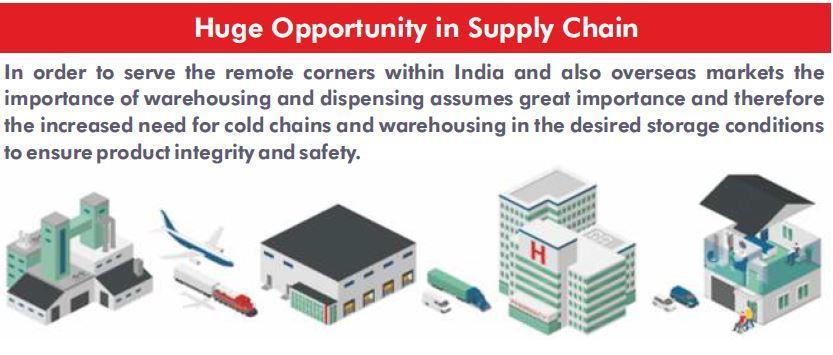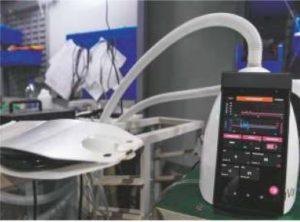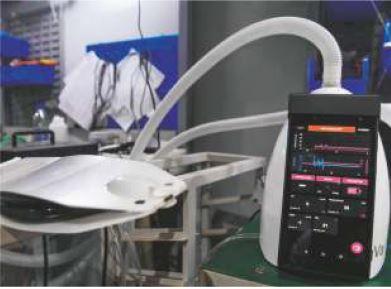COVID-19
A Great Opportunity: INDIAN PHARMA 2020-2030
Indian pharmaceutical industry aspires to become the world's largest supplier of drugs by 2030. India aims to increase its industry revenue to $120 billion-$130 billion by 2030 from current revenue of $38 billion at a CAGR of 11-12%. Of course, the current decade is for the Indian Pharma and related industries and offers a big opportunity which must be grabbed with both the hands and let this opportunity not slip away.
Yes, all this will require an effective and efficient cooperation between the Indian Pharma and backed with the much-needed support of the government in policy matters and regulations, etc.
Covid 19 and the fallout
The world is seeing the not so good behaviour of China in the recent months initially covering the situation on epidemic spread and later in not sharing information. It is well known that sharing the information at the right time could have saved precious lives across the globe and also saved the global economies and other related aspects. Even now, the world is witnessing that the weird mindset of the power few at the top in China as we see that China is selling the Covid related equipment and other essentials at a commercial advantage for the stuff that they received as medical aid a few weeks back (as reported by media)…
This is simply not acceptable morally and ethically and therefore, that may spell ‘advantage India’…
In the ensuing circumstances India should rise to the situation by capturing the opportunity, and for all this the Indian government should come out all guns blazing and work hand in hand with the pharma industry to effectively and efficiently support the industries which are inter-linked to the pharma sector.
The current events will certainly see lot of manufacturing going back to the west as the west have realised that they lost out both on manufacturing jobs and concerns on the quality aspects from time to time for the products from China. This I would term as ‘reverse swing’ where for long the west depended a lot on China and also that they themselves were not in a position to meet the COGS- cost effectiveness of the China offerings and slowly but surely we saw the manufacturing plants in Europe and US closing down as they were rendered cost ineffective.
However, we have recently seen that the drug major Sanofi has plans to create a major leading European company dedicated to the production and marketing to third parties of active pharmaceutical ingredients (API).
India too made a mistake where the Indian pharma kept on procuring the intermediates across the board including the ones which were polluting in nature from China at quite cost effective prices and did the last step conversion in the plants in India. The first time India got a jolt in this respect was at the time of Beijing Olympics 2008, where a large number of intermediates companies were closed suddenly under the Chinese government dictate and we in India found itself without the key input raw materials and if they got from alternate sources within China, the same came at astronomical prices.
The industry players thought that the situation will ease and get back to normal once the Olympics would be over and yes, to some extent it came down but we chose not to see the writing on the wall which was clear as we went for the ostrich approach instead.
We have also seen a sharp price rise on some of the Covid19 essential raw materials for the APIs – Bulk Actives which the world depends on China and this certainly does not auger well of a mature and responsible super-power at such a time of global epidemic.
In the ensuing circumstances India should rise to the situation by capturing the opportunity and for all this the Indian government should come out all guns blazing and work hand in hand with the pharma industry to effectively and efficiently support the following industries which are inter-linked to the pharma sector.
Indian Pharma Industry includes the following verticals:
- Contract Manufacturing, CRAMS and Clinical Trials
- API and KSMs – the starting Raw Materials – end to end within India
- Scale – The importance of Scale to meet the competition globally
- Green Chemistry and Enzymatic Processes
- High Potency Active Pharmaceutical Ingredient (HPAPI)
- Biotech and Biosimilars
- Complex Generics development
- Basic Chemicals, Building Blocks and Fermentation Capacities
- Enhanced Patenting and IP protection – must for attracting the Big Pharma
- Centralized Services – effluent treatment and Testing Laboratories
- CGMP Compliance, Data Integrity
- Enhance the Medical, Pharmacy and Nursing educational institutes with PPP
- Vaccine development and enhanced investment therein
Cold storage – warehousing – last mile product integrity and dispensing
E-pharmacy – quantum growth possible – firm up governing laws
FID – track and trace: problem of fake medicines
Much needed JVs with the best globally – revive IDPL kind?
Contract Manufacturing, CRAMS and Clinical Trials
Several overseas companies have been outsourcing research and clinical trials to Indian companies and some have entered into collaborative R&D arrangements to supplement their R&D productivity. Many foreign companies have also already initiated research on neglected diseases. Even the DNDi – Drugs for Neglected Diseases initiative – a Geneva based R&D Organization has been looking for Indian CDMOs to partner them for taking their R&D projects to commercial levels.
There is a lot of comfort MNCs in the west have while discussing the collaboration with sourcing these activities with Indian companies and all this has been based on performance, cost competitiveness and timely deliverables by the Indian CDMOs and also in the space of Clinical Trials.
This was amply observed when I was associated with a German based organisation which had large number of pharma projects that were being out-sourced from Indian pharma companies. The trend will further increase under the current situation where we will see some of the businesses making a shift from other countries in Asia to India as we progress from hereon.
This will further gain momentum as the patent regime in India has already strengthened and will become still stronger as we proceed. This will enable the companies in the west to capitalise on the cost savings to be gained from shifting some research activities to India, without jeopardising their most valuable intellectual property.
API and KSMs – the starting Raw Materials – end to end within India
India largely depends on China for its API needs at present, however, the current crisis has opened a window of opportunity for the Indian drug manufacturers to diversify their supply chains and to rely more on domestic suppliers which is a positive development in the longer term for the entire sector.
India has substantial technical capability for reverse engineering which saw a mushroom growth of pharma companies in India during the window of opportunity during 1995 – 2005. However, the subsequent period saw Indian pharma slackening their approach for falling prey to low cost input raw materials from China and also the Indian companies found an easy pathway to exit the manufacturing of highly polluting KSMs or Intermediates thereby making a grave mistake to increase their dependence on inputs from China. This needs to be corrected on immediate basis to ensure that end to end solutions are available within the country for reasons of self-dependant and cost competitiveness in the long-run. World has seen recently how profiteering was resorted to by some countries in the face of pandemic which is the last thing expected of matured nations i.e to make money at the cost of someone’s misery.
 There is a lot of comfort MNCs in the west have while discussing the collaboration with sourcing these activities with Indian companies and all this has been based on performance, cost competitiveness and timely deliverables by the Indian CDMOs and also in the space of clinical trials.
There is a lot of comfort MNCs in the west have while discussing the collaboration with sourcing these activities with Indian companies and all this has been based on performance, cost competitiveness and timely deliverables by the Indian CDMOs and also in the space of clinical trials.
Scale – the importance of Scale to meet the competition globally
Scale is something which is a must to effectively compete in the world, if we are to be seen as a Pharmacy to the World… India can never be seen as a formidable pharma player when their capacities are short and look like pilot plants in comparison to the installed capacities in others be it China or the west. The scale of operations will spell the difference and would be the single most important aspect when we compete globally.
Green Chemistry and Enzymatic Processes
Commercials are ultimately important and therefore the costs have to be focussed for addressing the COGS and the ever-decreasing margins in the generic business across the globe. Though, in the recent times, the supply chain stalwarts upon being interviewed as reported by authentic research firms have mentioned that price is not the most important factor but there are others like GMP compliance, batch to batch consistency and non-interference of human element and ensuring data integrity are equally important parameters. In spite of all this, the cost of inputs is important in some of the wafer-thin margin businesses.
There is a limit to cost reduction in a chemical process and once that has been exhausted, then, we need to explore the use of green chemistry and also introduction of enzymatic steps in various side-chains in the multi-step manufacturing process to optimize cost of manufacturing.
High Potency Active Pharmaceutical Ingredient
The development in the High Potency Active Pharmaceutical Ingredient (HPAPI) and biogeneric drugs is going to boost the growth of the Active Pharmaceutical Ingredient (API) market. There has been a paradigm shift in the use of innovative drugs to that of low-cost API drugs after the last economic recession, thereby causing a positive impact on the overall growth of the API market.
In order to keep abreast with this change, API manufacturers are applying various novel technologies to reduce the processing time in order to yield more production. For sure, the High Potency APIs is another window of opportunity to focus for great returns.
Biotech and Biosimilars
India has a reasonably good presence in biotechnology industry which is based in Karnataka, West Bengal, Maharashtra, Andhra Pradesh, Telangana, Kerala and Ahmedabad. The leading Indian players include Serum Institute of India, which focuses on immuno-biologicals and vaccines; Biocon, which concentrates on recombinant DNA technologies, bioprocesses, fermentation-based small molecules and enzymes; and Panacea Biotec, which specialises in novel drug delivery techniques and pharmacogenomics. Indian biotech companies are slowly building capabilities in development and manufacturing of biosimilars.

India largely depends on China for its API needs at present, however, the current crisis has opened a window of opportunity for the Indian drug manufacturers to diversify their supply chains and to rely more on domestic suppliers which is a positive development in the longer term for the entire sector.
Intas Biopharmaceuticals is another company which has done some good work in developing a biosimilar of a protein in the cancer therapy. The challenge for the development of biosimilars arises as the biologics are more complex than small molecules and chemically synthesised drugs. In other words, their replica is ‘similar’ but not identical to the original drug. Complex Generics development
Complex Generics development
A complex generic product is a medicine that can be prescribed as a substitute for the originator specialized product because the bioequivalence has been demonstrated; however, it is not as simple as generics to get manufactured. Indian pharma is already have their focus on this attractive area.
Basic Chemicals, Building Blocks and Fermentation Capacities
The basic chemicals companies in India have in the recent past had a great run on the bourses for the simple reason that the supply chain from China was getting impacted in view of the Covid-19 situation and that all these companies like SRF, Atul, Navin Fluorine, Aarti Industries, Deepak Nitrite, GACL, UPL, amongst others have been doing some very good work in the basic chemicals and now is the time for these companies to focus on select chemicals and speciality chemicals and enhance the scale to meet the global demand as once again there is a good possibility for a procurement shift taking place in favour of India. To reiterate the economies of scale would be most critical in order to compete in the global platform.
Enhanced Patenting and IP protection – must for attracting the Big Pharma
Indian companies have realised in the last decade the importance of filing patents and therefore India as a whole in pharma and other sectors have been actively filing the patents to get the much-needed advantage of ‘patenting’. In addition to filing patents by Indian companies there is an equal importance to respect patents and intellectual property of others as that will help get the overseas company to partner with Indian companies.
 Centralized Services – effluent treatment and Testing Laboratories
Centralized Services – effluent treatment and Testing Laboratories
In order to get advantages of some of the common services e.g the effluent treatment, common testing laboratories for conducting high end testing of samples at various stages, it is important to have a centralized laboratories which can with the help of Government get the funding at favourable terms and set-up state of the art labs. This will help channelize the companies in the medium and small-scale pharma companies not to spend heavily the lab equipment CAPEX on, and the funds so released can be effectively used in other innovative pharma solutions.
In addition to filing patents by Indian companies there is an equal importance to respect patents and intellectual property of others as that will help get the overseas company to partner with Indian companies.
CGMP Compliance, Data Integrity
The importance of GMP compliance and data integrity cannot but be over-emphasized as we have seen large pharma companies facing the wrath of the USFDA when the companies have erred. Therefore, the workforce needs to be educated and trained on a regular basis to make them understand the changing needs of the pharma industry and comply to those SOPS in letter and spirit.
Enhance Medical, Pharmacy, Nursing educational institutes with PPP
The skilled manpower is a resource in shortage today and every step should be taken in this direction to provide the industry with the right quality of skilled manpower at every stage as the strength of the strongest chain lies in its weakest link.
Continuous learning and upgrading of skills, is the need of the dynamic pharma industry today.
Vaccine development and enhanced investment therein
Vaccines are another important area of growth. India is one of the largest vaccine producers in the world. India services approximately 70% of the world’s total vaccine requirement. A large number of new vaccines are set to be launched in the coming 3-5 years. The two companies – Bharat Biotech and the Serum Institute with their collaborators overseas have been in the news recently for doing some pioneering work in the development of the vaccines to combat Covid-19 situation. Also, Cadila, Panacea Biotech, Biological E, are other known name for the vaccine manufacturing in India who are working on the Covid-19 solutions.
 Cold storage – warehousing – last mile product integrity and dispensing
Cold storage – warehousing – last mile product integrity and dispensing
Storage of temperature sensitive medicines and vaccines is most important to be maintained for the entire length of the supply chain. This is important for maintaining the product efficacy and product integrity for the entire length of the shelf life of the product and to ensure that the product is as per label claim till the point of administration of the drug product to the patient.
In order to serve the remote corners within India and also overseas markets the importance of warehousing and dispensing assumes great importance and therefore the increased need for cold chains and warehousing in the desired storage conditions to ensure product integrity and safety. A huge opportunity is envisaged in this part of the supply chain.
E-pharmacy – quantum growth possible – firm up governing laws
The rise of digital India and with it there has been a phenomenal rise to the e-pharmacies and thereby aiding the much-needed process to make the medicines reach the remote corners of India and also a much desired connect globally.
However, the functioning of e-pharmacies requires the framing of rules and regulations that will govern the running of these platforms to ensure the medico-legal compliances etc. While rules have been in place to some extent but these need to be revisited to ensure plugging any holes to ensure that the patient gets the right product at the correct terms and conditions.
 RFID – track and trace: problem of fake medicines
RFID – track and trace: problem of fake medicines
It is a matter of grave concern that the domestic India market and elsewhere, the problem that the industry faces in terms of fake medicines. For sure the technology has to come to the rescue to address this problem be it track and trace, holograms, bar coding etc to ensure that the right product is delivered to the patient.
Much needed JVs with the best globally – revive IDPL kind?
The current epidemic has once again made a case to review our policy to look at the possibility of having governments role in the industry like what we had in the past in terms of IDPL – Indian Drugs and Pharmaceuticals Limited which had some state-of- the-art manufacturing plants and high tech products like Pen G, vitamins etc., and it also had some tie-ups with global companies in terms of technology.
We all very well know that the closure of IDPL Hyderabad gave a rise to the mushroom growth of pharma industry in the then undivided state of Andhra Pradesh which the country is still proud of. Well the government role might not be the ideal one to contemplate in the current times, but certain products Vitamins, Pen-G, Tetracyclines might call for a different approach or government backed incentive scheme or additional support in terms of energy intensive fermentation-based product.


The current epidemic has once again made a case to review our policy to look at the possibility of having governments role in the industry like what we had in the past in terms of IDPL – Indian Drugs and Pharmaceuticals Limited, which had some state-of-the-art manufacturing plants and high tech products like Pen G, vitamins etc., and it also had some tie-ups with global companies in terms of technology
 Medical Devices – The situation of ventilators is a case in point
Medical Devices – The situation of ventilators is a case in point
The medical devices industry in India consists of large multinationals, with extensive service networks, as well as small and medium enterprises (SMEs). The medical devices include – diagnostic imaging, IV diagnostics, consumables, patient aids, orthopaedic prosthetics, dental products and other medical devices. The awareness around the need to have a robust medical devices ecosystem in the country is gaining importance resulting in higher growth rates for India as compared to the global industry.
For sure the Indian medical devices industry has an opportunity to leapfrog innovation combining physical devices and integrating with the digital framework. It is an opportune time for the Indian pharma companies to consider adding a new vertical of medical devices and getting into JVs with some of the MNCs for making the devices in India and with innovation bring down the costs and service the growing needs of a large populace.
The recent pandemic has seen a large number of small and large corporate houses getting into the act of making low cost-effective ventilators which is a tremendous case in point to demonstrate this aspect of opportunity and serving the large numbers in India and will also help boost the Make in India plans.
Chemicals Industry – a big opportunity here
Chemicals industry in India is highly diversified and it covers bulk chemicals, specialty chemicals, agrochemicals, petrochemicals, polymers and fertilizers. India is a strong global dye supplier and accounts a little over 15% of the world production of dyestuff and dye intermediates.
The current situation has given the chemicals industry in India to assess its strengths and weaknesses and in the process of self-assessment look at areas where it can measure up to the end user industries effectively and efficiently.
Hospitals – infrastructure push and medical tourism as a result thereof
It is a well-known fact that the hospital beds and the patient ratio in the country is abysmally low. While we have seen a large private investment that has taken place in India in the last two decades with the result, we find that the condition of the government hospitals have been going down over the years or it is also that the corporates realised that the standards were going down in the government managed hospitals and they saw an opportunity to get in and make big bucks… ironically the same what we have seen in the education sector.
Of course, we have few pockets of excellence like the AIIMS, PGI etc., but there is an urgent need for the government to get into the act of creating large number of hospitals and at the same time encourage the private sector to invest further by extending attractive sops. For sure there is a need for increasing the medical colleges which will help in increasing the number of doctors and the nursing and other support staff. Mind you, the government should see that the private hospitals conduct themselves in the right manner by that it is meant that the medical ethics must be followed in letter and spirit.
To summarise, Indian pharma companies had been an underperformer over the last decade or so and finally the tide has turned in its favour though in unfortunate circumstances. The global pandemic has thrown open a lot of opportunities to Indian pharma companies and related sectors like medical devices, hospitals and medical tourism etc. We also noticed how fast the Indian pharma geared up to service the HCQ and Chloroquine salts-based drug product to countries across the globe while ensuring sufficient SKUs for the Indian population. The Indian pharma units also witnessed several approvals from US FDA in the recent weeks augurs good for the Industry. For sure, India has won a lot of goodwill which, in turn has helped the perception of Indian generic drug manufacturers. It is opportune time for the India pharma to leverage this opportunity to the maximum.
 Gurmeet Singh is Director Pharma Networks – a veteran for over 30 years in the Indian pharmaceutical sector. He has served some of the best pharma companies at the decision-making levels in companies like Ranbaxy, Wockhardt – Swiss and Ireland, Orchid Pharma and Midas GmbH. He was retained as Pharma Development Consultant with DNDi – Drugs for Neglected Diseases initiative, a Geneva based R&D organization. Mr. Singh is a Bachelor at Law (LL.B), a Post Graduate in Management Studies and Post Graduate Diploma in Intellectual Property Rights Law. He can be contacted on gurmeetsingh144@hotmail.com and +919703599123
Gurmeet Singh is Director Pharma Networks – a veteran for over 30 years in the Indian pharmaceutical sector. He has served some of the best pharma companies at the decision-making levels in companies like Ranbaxy, Wockhardt – Swiss and Ireland, Orchid Pharma and Midas GmbH. He was retained as Pharma Development Consultant with DNDi – Drugs for Neglected Diseases initiative, a Geneva based R&D organization. Mr. Singh is a Bachelor at Law (LL.B), a Post Graduate in Management Studies and Post Graduate Diploma in Intellectual Property Rights Law. He can be contacted on gurmeetsingh144@hotmail.com and +919703599123






